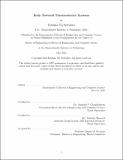| dc.contributor.advisor | Anantha P. Chandrakasan and Timothy Hancock. | en_US |
| dc.contributor.author | Settaluri, Krishna Tej | en_US |
| dc.contributor.other | Massachusetts Institute of Technology. Dept. of Electrical Engineering and Computer Science. | en_US |
| dc.date.accessioned | 2013-02-13T21:24:18Z | |
| dc.date.available | 2013-02-13T21:24:18Z | |
| dc.date.copyright | 2012 | en_US |
| dc.date.issued | 2012 | en_US |
| dc.identifier.uri | http://hdl.handle.net/1721.1/76819 | |
| dc.description | Thesis (M. Eng.)--Massachusetts Institute of Technology, Dept. of Electrical Engineering and Computer Science, 2012. | en_US |
| dc.description | This electronic version was submitted by the student author. The certified thesis is available in the Institute Archives and Special Collections. | en_US |
| dc.description | Cataloged from student-submitted PDF version of thesis. | en_US |
| dc.description | Includes bibliographical references (p. 107-111). | en_US |
| dc.description.abstract | Great interest exists for and progress has be made in the effective utilization of the human body as a possible power supply in hopes of powering such applications as sensors and continuously monitoring medical devices [1]. This report furthers into the area of thermal energy harvesting, which focuses on using the temperature differential generated between the human body and the ambient environment to generate power. More specifically, a body-powered, thermoelectric-based power supply and system will be introduced and examined, with hopes that this technology will be utilized alongside low-power, medical monitoring applications in order to achieve self-sufficiency. This report also analyzes the performance of existing thermoelectric-based body-powered energy harvesting applications and compares that with the new design introduced in this work. The new designs were able to output upwards of 25[mu]W/cm2 or, equivalently, 280µW for the entire heat sink system. Additionally, this report details the physics associated with thermoelectric modules, addresses the issues with modern thermoelectric heat-sinks, introduces two new types of wearable, conformal heat sinks, quantifies the performance of the body-powered thermoelectric supply, tests a flexible EKG processing board, and analyzes future paths for this project. | en_US |
| dc.description.statementofresponsibility | by Krishna Tej Settaluri. | en_US |
| dc.format.extent | 111 p. | en_US |
| dc.language.iso | eng | en_US |
| dc.publisher | Massachusetts Institute of Technology | en_US |
| dc.rights | M.I.T. theses are protected by
copyright. They may be viewed from this source for any purpose, but
reproduction or distribution in any format is prohibited without written
permission. See provided URL for inquiries about permission. | en_US |
| dc.rights.uri | http://dspace.mit.edu/handle/1721.1/7582 | en_US |
| dc.subject | Electrical Engineering and Computer Science. | en_US |
| dc.title | Body powered thermoelectric systems | en_US |
| dc.type | Thesis | en_US |
| dc.description.degree | M.Eng. | en_US |
| dc.contributor.department | Massachusetts Institute of Technology. Department of Electrical Engineering and Computer Science | |
| dc.identifier.oclc | 825771320 | en_US |
